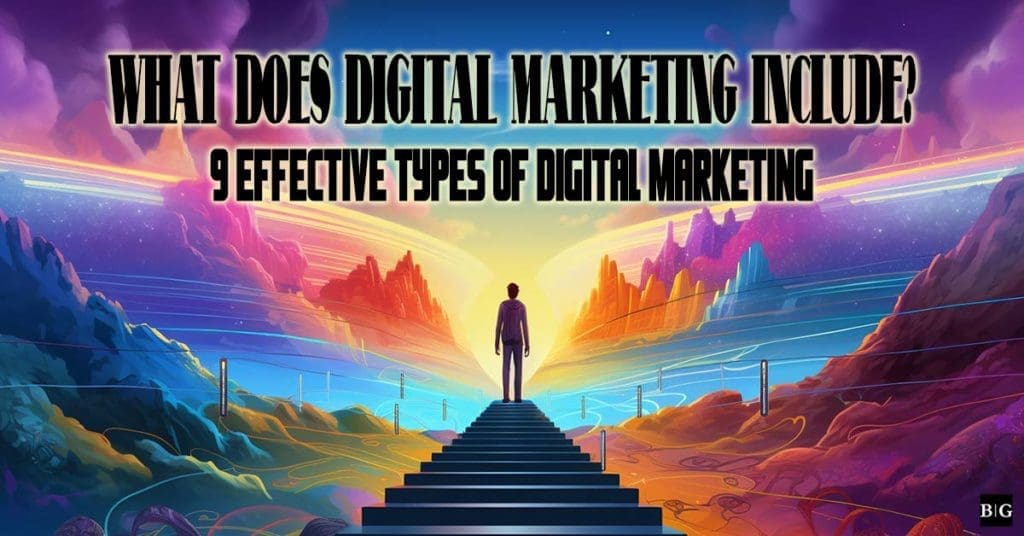What Does Digital Marketing Include? 9 Effective Types of Digital Marketing
Digital marketing is a vast and dynamic field that encompasses a variety of strategies designed to connect businesses with their target audience in the online world. This article will provide a comprehensive overview of the nine effective types of digital marketing, helping you understand how each strategy works and how it can benefit your business. Whether you’re a seasoned digital marketer or a business owner looking to expand your online presence, this guide will offer valuable insights to enhance your marketing efforts.

What does Digital Marketing Include? A Deep Dive into the 9 Effective Types of Digital Marketing
What is Digital Marketing, and Why is it Important?
Digital marketing, in its simplest form, is the use of digital channels to promote products, services, or brands. It’s a broad field that encompasses various strategies and techniques designed to reach people through digital technologies, primarily the Internet.
Digital marketing includes strategies like search engine optimization (SEO), content marketing, social media marketing, pay-per-click advertising (PPC), affiliate marketing, and email marketing. These strategies serve a unique purpose and can be used in different customer journey stages, from awareness and consideration to conversion and retention.
But why is digital marketing so important? Here are a few key reasons:
1. Global Reach
Digital marketing allows businesses to reach a global audience. With traditional marketing, your reach is often limited by geographical boundaries. However, digital marketing allows you to connect with people around the world, opening up new market opportunities.
businesses to reach a global audience. With traditional marketing, your reach is often limited by geographical boundaries. However, digital marketing allows you to connect with people around the world, opening up new market opportunities.
2. Cost-Effective
Compared to traditional marketing methods, online marketing is often more cost-effective. For instance, running an ad campaign on social media or optimizing your website for search engines can be less expensive than running a TV ad or billboard campaign, making digital marketing a great option for businesses of all sizes.
3. Measurable Results
One of the biggest advantages of digital marketing is the ability to track and measure results. With online marketing tools, you can track the number of visitors to your site, the number of page views, the average time spent on your site, and more. This data can provide valuable insights into your audience and help you make informed marketing decisions.
4. Personalization
Digital marketing allows for a high level of personalization. With tools like email marketing and targeted advertising, you can deliver personalized messages to your audience based on their interests, behavior, and more. This level of personalization can lead to higher conversion rates and customer satisfaction.
5. Improved Conversion Rates
With digital marketing, businesses can communicate with their customers in real time. This immediate communication can help improve conversion rates as customers are often more likely to buy when they can engage with a brand in real time.
6. Competitive Advantage
Finally, digital marketing can provide a competitive advantage. With the ability to reach a global audience, track and measure results, personalize messages, and improve conversion rates, businesses that leverage digital marketing can often outperform their competitors, who rely solely on traditional marketing methods.
Digital marketing is a critical component of modern business. It offers numerous benefits and opportunities for businesses to connect with their audience, grow their brand, and drive sales. Whether you’re a small business owner or a marketing professional, understanding digital marketing is essential to succeed in today’s digital world.
How Does an Online Marketing Strategy Work?
An online marketing strategy is a comprehensive plan that outlines how a business will achieve its marketing goals through the use of online and digital channels. It’s a roadmap to achieving your business objectives using online marketing. Here’s a closer look at how a digital marketing strategy works:

Digital marketing has become critical for small businesses. Your strategy must be on point.
1. Setting Goals
Defining your goals is the first step in creating a digital marketing strategy. What do you want to achieve with your digital marketing efforts? This could be anything from increasing website traffic, boosting brand awareness, generating leads, or increasing sales. Clear, measurable goals are crucial as they guide your strategy and allow you to track your progress.
2. Identifying Your Target Audience
Once you have your goals set, the next step is to identify your target audience. Who are the people you’re trying to reach with your digital marketing efforts? Understanding your audience’s demographics, interests, behaviors, and online habits can help you create more effective and targeted marketing campaigns.
3. Choosing Your Digital Marketing Channels
Numerous digital marketing channels are available, and the best ones for your business will depend on your goals and target audience. Some of the most common digital marketing channels include your website, search engines (SEO and PPC), social media, email, content marketing, and affiliate marketing. Each channel has its strengths and can be used to achieve different goals.
4. Creating and Distributing Content
Content is at the heart of digital marketing. Whether it’s blog posts, social media updates, emails, videos, or infographics, creating high-quality, relevant content is key to engaging your audience and driving your digital marketing efforts. Once you’ve created your content, you’ll need to distribute it through your chosen digital marketing channels.
5. Analyzing and Adjusting Your Strategy
Finally, ongoing analysis and adjustment are crucial to any digital marketing strategy. Digital marketing provides a wealth of data that you can use to track your progress and measure your success. This includes metrics like website traffic, click-through rates, and conversion rates. By regularly analyzing this data, you can gain insights into what’s working and not and how to improve your strategy.
A digital marketing strategy works by clearly defining your goals, understanding your audience, choosing the right digital marketing channels, creating and distributing content, and continuously analyzing and adjusting your approach. It’s a dynamic process that requires ongoing effort and attention, but with the right strategy in place, digital marketing can drive significant results for your business.
Exploring the 9 Types of Digital Marketing

Create an effective digital marketing strategy.
Digital marketing is a vast field, encompassing a variety of strategies and techniques. Here’s a closer look at nine of the most common types of digital marketing:
1. Search Engine Optimization (SEO)
Search Engine Optimization, or SEO, is the practice of optimizing your website to rank higher in search engine results pages (SERPs). This is achieved through a combination of on-page optimization, such as keyword optimization and meta tag creation, and off-page optimization, such as link building and social media marketing. SEO aims to increase organic (non-paid) traffic to your website, which can lead to increased visibility and higher conversion rates.
2. Pay-Per-Click (PPC) Advertising
Pay-Per-Click, or PPC, is a type of digital marketing where advertisers pay a fee each time one of their ads is clicked. This is typically done through platforms like Google Ads or Bing Ads. The goal of PPC is to drive paid traffic to your website, with the hope that these visits result in conversions. PPC allows for precise targeting to reach potential customers based on location, age, interests, and more.
3. Content Marketing
Content marketing involves creating and sharing valuable content to attract and convert prospects into customers and customers into repeat buyers. This can include blog posts, videos, infographics, ebooks, webinars, and more. Content marketing aims to provide value to your audience, build trust, and position your business as an authority in your industry.
4. Social Media Marketing
Social media marketing involves promoting your content and engaging with your audience on social media channels like Facebook, Instagram, LinkedIn, and Twitter. This can involve organic tactics, like posting regular updates and interacting with followers, as well as paid tactics, like running social media ad campaigns. Social media marketing can increase brand awareness, drive traffic, and generate leads.
5. Email Marketing
Email marketing is a form of direct marketing that involves sending promotional messages to a group of people via email. This can include newsletters, promotional offers, announcements, and more. Email marketing is a great way to nurture leads, boost customer loyalty, and increase sales.
6. Affiliate Marketing
Affiliate marketing involves partnering with external parties (affiliates) who promote your products or services in exchange for a commission on any sales they generate. This can be a cost-effective way to drive traffic and sales, as you only pay for results.
7. Inbound Marketing
Inbound marketing is a strategy that involves attracting customers by creating valuable content and experiences tailored to them. This can involve a variety of digital marketing tactics, including content marketing, SEO, social media marketing, and more. Inbound marketing aims to attract, engage, and delight customers, leading to business growth.
8. Mobile Marketing
Mobile marketing involves reaching your audience through their mobile devices via channels like email, SMS, social media, and apps. Mobile marketing is more important than ever with the increasing use of smartphones and tablets. It allows for highly targeted and personalized marketing efforts.
9. Video Marketing
Video marketing involves using video to promote and market your products or services. This can involve creating video ads, product demos, tutorials, and more. Video marketing can be a powerful way to engage your audience, explain complex topics, and tell your brand’s story.
Each of these types of digital marketing has its own strengths and can be used to achieve different goals. By understanding each type and how it can benefit your business, you can create a more effective and comprehensive digital marketing strategy.
Wrapping Up: Harnessing the Power of Digital Marketing
In the dynamic landscape of today’s business world, digital marketing has emerged as a powerful tool to connect, engage, and convert audiences worldwide. With its diverse strategies, from SEO and PPC to content marketing and beyond, digital marketing offers a unique blend of tools to reach out to your audience, tell your brand’s story, and drive business growth.
But remember, the magic of digital marketing doesn’t lie in mastering all the types but in understanding which ones align best with your business goals and audience’s needs. It’s about crafting a unique mix that resonates with your audience and amplifies your brand message.
So, whether you’re just starting your digital marketing journey or looking to refine your existing strategy, remember that the digital world is your oyster. With the right approach, a dash of creativity, and a constant eye on your performance metrics, you can harness the power of digital marketing to propel your business to new heights.
So go ahead, dive into the world of digital marketing, and let your brand’s digital journey unfold!
Frequently Asked Questions about the 9 Effective Types of Digital Marketing
Q: What is a digital marketer?
A: A digital marketer is a professional who specializes in planning, executing, and managing digital marketing campaigns. They are responsible for implementing various online marketing strategies and tactics to achieve marketing goals.
Q: What are marketing channels in digital marketing?
A: Marketing channels in digital marketing refer to the various online platforms and channels through which businesses can promote their products or services to reach their target audience. Examples of digital marketing channels include search engines, social media platforms, email, websites, and mobile apps.
Q: What is mobile marketing?
A: Mobile marketing is a form of digital marketing that specifically targets mobile device users. It includes activities such as mobile app advertising, SMS marketing, mobile-friendly website optimization, and location-based marketing.

